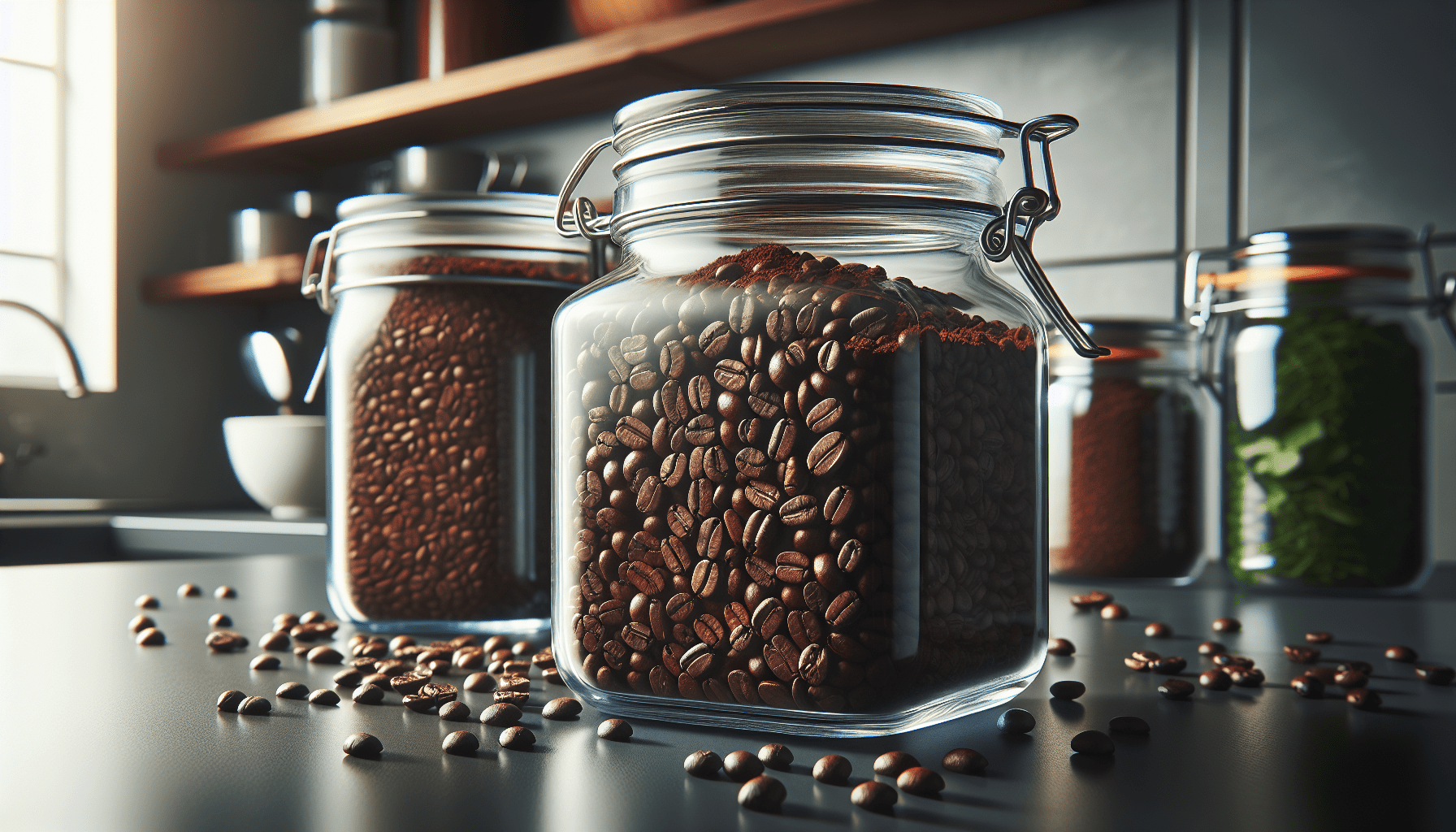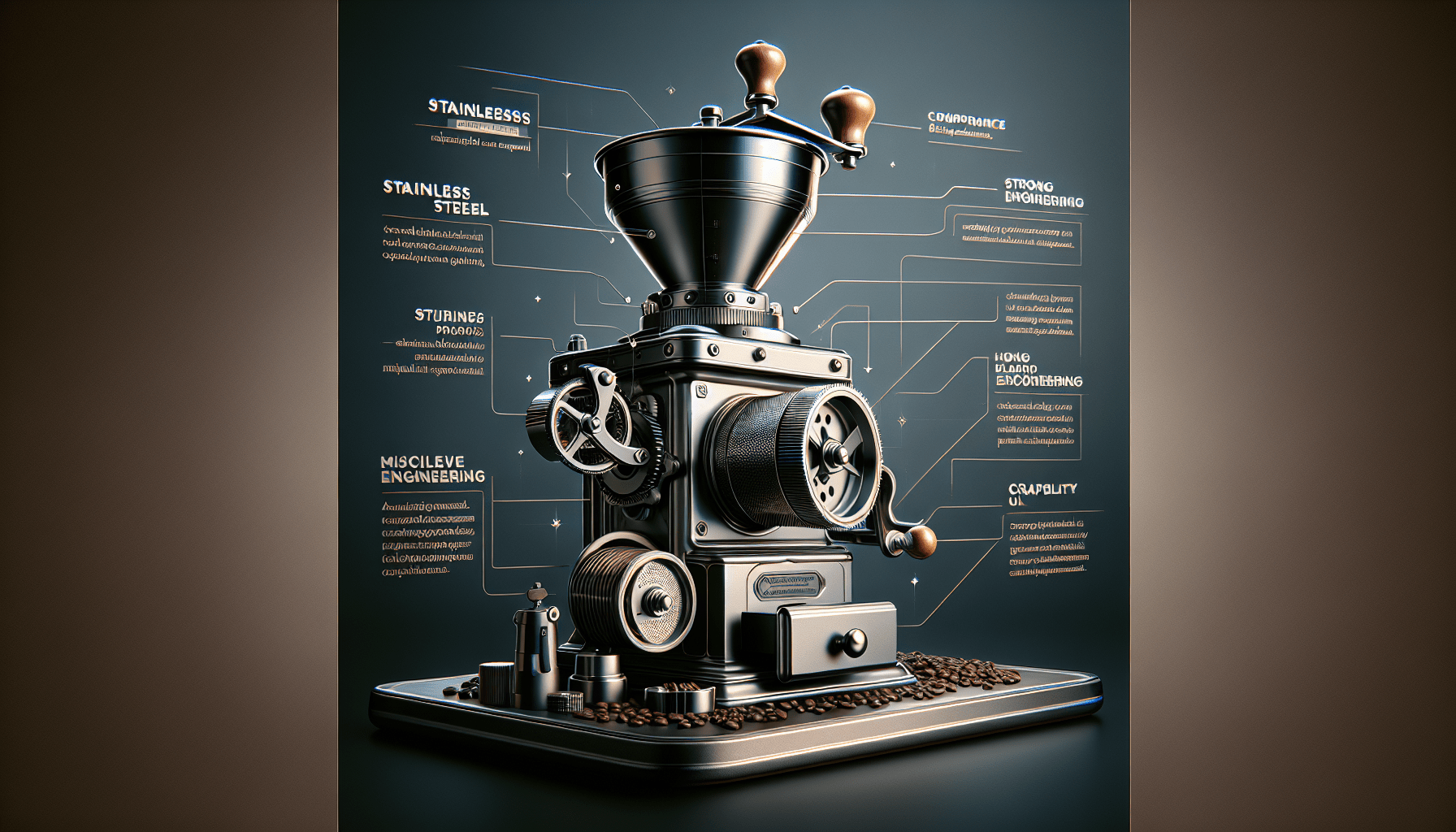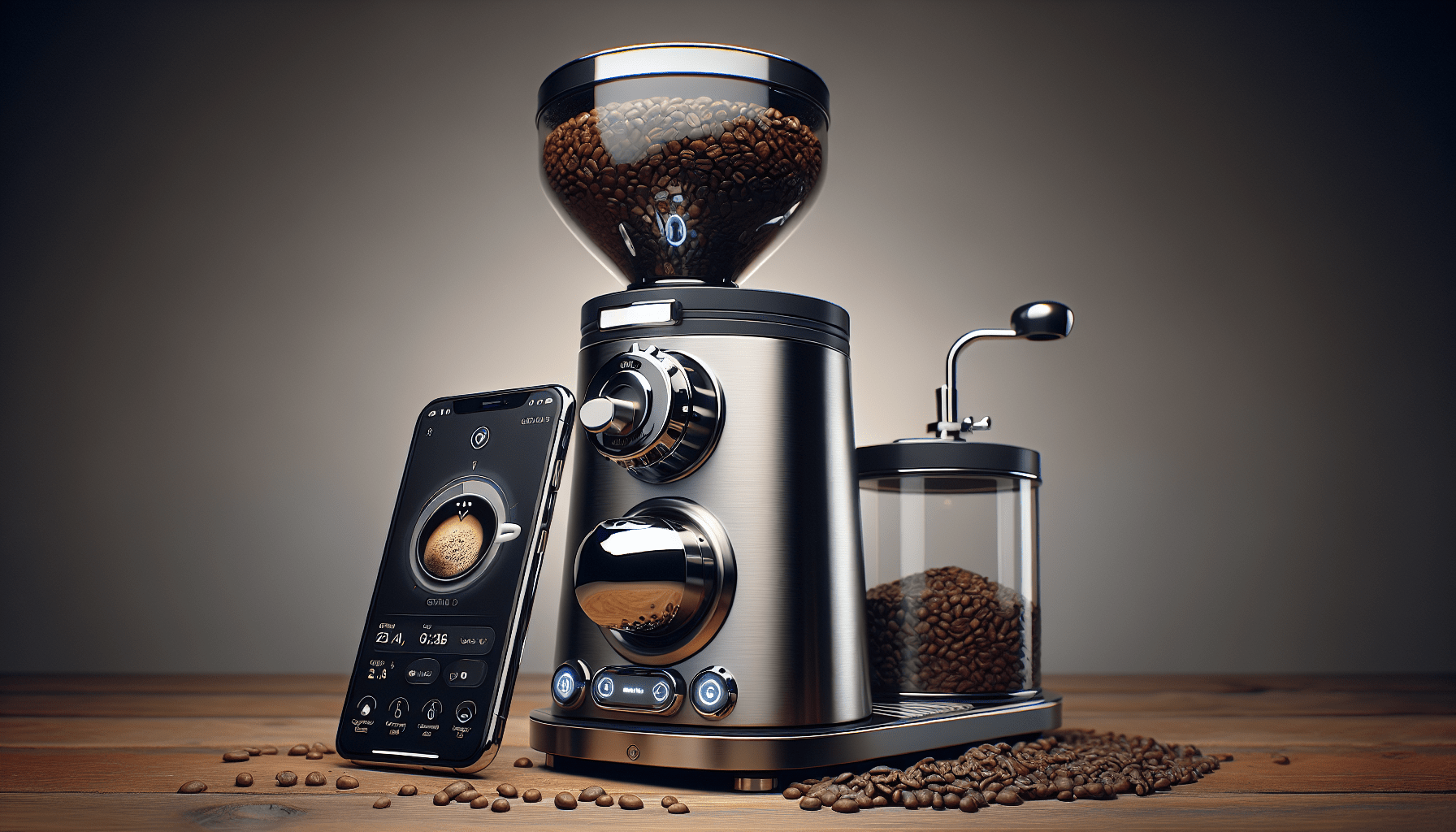Once you’ve mastered the art of grinding your coffee beans to perfection using a coffee grinder machine, the next important step is to ensure they are stored correctly to preserve their freshness and flavor. But what is the best way to store those perfectly ground coffee beans? In this article, we will explore some tried and true methods that will keep your coffee tasting its best for as long as possible. So sit back, grab a freshly brewed cup of java, and let’s embark on a journey to discover the secrets of storing ground coffee beans.
Why is proper storage important?
Proper storage is essential for maintaining the flavor and freshness of coffee beans. When coffee beans are exposed to improper storage conditions, it can have a significant impact on their flavor and overall quality. By understanding the importance of proper storage, you can ensure that every cup of coffee you brew is delicious and satisfying.
The impact of improper storage on coffee flavor
Improper storage can have a detrimental effect on the flavor of coffee beans. When coffee beans are exposed to air, light, and fluctuating temperatures, they begin to deteriorate, resulting in a loss of flavor and aroma. The delicate oils and compounds that give coffee its unique taste can easily be damaged when not stored correctly.
The importance of preserving freshness
Preserving the freshness of coffee beans is crucial in maintaining their optimal flavor. Coffee beans contain natural oils that can go rancid when exposed to oxygen, heat, and light. By storing coffee beans properly, you can ensure that these oils are protected, allowing you to enjoy the full and vibrant flavors of freshly roasted coffee for an extended period.
Potential risks of improper storage
Improper storage of coffee beans can lead to various risks, including flavor degradation and the growth of mold or bacteria. When coffee beans are exposed to moisture, they can become a breeding ground for microorganisms that can compromise their quality and safety. Additionally, inconsistent storage conditions can accelerate the aging process of the beans, resulting in stale and lackluster coffee.
Factors to consider when storing ground coffee beans
When it comes to storing ground coffee beans, several factors must be taken into consideration to maintain their freshness and flavor.
Exposure to air
One critical factor in storing ground coffee beans is minimizing their exposure to air. Oxygen can quickly degrade the quality of coffee beans, causing them to go stale. To prevent this, it is important to store the beans in airtight containers that will block the entry of air and preserve their freshness.
Effect of light on coffee beans
Light is another element that can negatively impact the flavor and quality of coffee beans. Exposure to direct sunlight or strong artificial light can cause the beans to undergo chemical reactions, resulting in a loss of flavor and aroma. To protect your coffee beans from light, it is advisable to store them in opaque containers or keep them in a dark and cool pantry or cupboard.
Impact of temperature
Temperature plays a crucial role in preserving the freshness and flavor of ground coffee beans. Storing coffee beans in an environment with consistent temperatures is essential to prevent the deterioration of their quality. Extreme heat or cold can affect the oils and compounds present in the beans, leading to flavor degradation. It is recommended to store coffee beans at room temperature, ideally between 65°F and 70°F (18°C to 21°C).
Humidity and its role in coffee bean storage
Humidity can significantly impact the quality and shelf life of coffee beans. Excessive moisture can cause the beans to absorb it, resulting in a loss of flavor and the growth of mold or bacteria. Conversely, low humidity levels can cause the beans to dry out and become stale. It is crucial to store coffee beans in a dry environment, away from sources of heat and moisture, to maintain their freshness and flavor.
Best containers for storing coffee beans
Choosing the right container for storing coffee beans is essential for preserving their freshness and flavor over time.
Airtight containers
When it comes to preserving the flavor and aroma of coffee beans, airtight containers are a must. These containers create a barrier that prevents the entry of air and helps maintain the freshness of the beans. Airtight containers can be made of various materials, such as stainless steel or glass, as long as they provide an effective seal to keep air out.
Opaque containers
To protect coffee beans from the detrimental effects of light, it is advisable to store them in opaque containers. Opaque containers block the entry of light, preventing the beans from undergoing chemical reactions that can result in flavor degradation. Look for containers made of materials like ceramic or stainless steel that do not allow light to penetrate.
Vacuum-sealed containers
Vacuum-sealed containers are an excellent option for storing coffee beans, as they remove excess air, minimizing the oxidation process. By eliminating the oxygen inside the container, coffee beans can retain their freshness for longer periods. Vacuum-sealed containers are often made of durable materials, such as stainless steel or BPA-free plastic, and provide a secure environment for the beans.
Glass jars vs. plastic containers
When choosing between glass jars and plastic containers for coffee bean storage, there are a few factors to consider. Glass jars are excellent for storing coffee beans that will be consumed relatively quickly as they do not retain odors. However, glass jars are not always airtight, so if long-term storage is required, a more airtight option, such as BPA-free plastic or stainless steel, may be preferable. Plastic containers can effectively block air and light, but be sure to choose BPA-free options to avoid any potential chemical leaching.
The role of temperature in coffee bean storage
Temperature plays a crucial role in the proper storage of coffee beans. understanding the optimal temperature and avoiding extreme fluctuations is key in maintaining the freshness and flavor of the beans.
Understanding optimal temperature
The ideal temperature for storing coffee beans is between 65°F and 70°F (18°C to 21°C). At this temperature range, the beans can maintain their flavor and aroma without being subjected to excessive heat or cold. It is important to store coffee beans in a cool area of your home, away from direct sunlight, heat sources, and appliances that generate heat.
Avoiding extreme temperature fluctuations
Extreme temperature fluctuations can have a detrimental effect on the quality of coffee beans. Rapid changes in temperature can cause the oils and compounds in the beans to expand and contract, leading to flavor degradation and overall deterioration. To prevent this, store coffee beans in an area with a stable and consistent temperature, avoiding places like the kitchen near the oven or on top of the refrigerator.
Refrigerating or freezing coffee beans
While some people opt to refrigerate or freeze their coffee beans, it is generally not recommended unless absolutely necessary. Storing coffee beans in the refrigerator or freezer can expose them to unwanted moisture, affecting their flavor. Additionally, the frequent opening and closing of these storage compartments can cause temperature fluctuations. If refrigeration or freezing is the only option, it is essential to use airtight containers to prevent moisture and odor absorption.
Avoiding exposure to light
Light is an enemy of coffee beans as it can lead to flavor degradation and loss of quality. Understanding how light affects coffee beans, choosing appropriate storage options, and considering the location of storage are key to preventing light exposure.
How light affects coffee flavor
Exposure to light can cause coffee beans to undergo chemical reactions, resulting in flavor degradation. Ultraviolet (UV) rays from sunlight or strong artificial light can break down the delicate oils and compounds present in the beans, leading to a loss of flavor and aroma. It is important to protect coffee beans from light to preserve their quality and freshness.
Choosing dark and opaque storage options
To prevent light exposure, it is advisable to store coffee beans in dark and opaque containers. These containers block out light, preventing its harmful effects on the beans. Ceramic or stainless steel containers are excellent options for storing coffee beans, as they provide a dark and protective environment. Alternatively, storing coffee beans in a cool and dark pantry or cupboard can also help minimize light exposure.
Location considerations for storage
When selecting a location for coffee bean storage, it is crucial to consider the potential exposure to light. Avoid storing coffee beans in areas with direct sunlight, such as near windows or under bright overhead lights. Instead, choose a cool, dark, and dry area of your kitchen or pantry for optimal storage conditions. Properly storing beans away from light sources will help maintain their flavor and quality.
Preventing moisture damage
Moisture is one of the greatest enemies of coffee beans, as it can lead to mold growth, flavor loss, and overall deterioration. By understanding the negative impact of moisture, storing coffee beans away from heat and moisture sources, and using moisture-absorbing agents, you can protect your beans from unnecessary damage.
The negative impact of moisture on coffee beans
Exposure to moisture can have a detrimental effect on the quality and flavor of coffee beans. Moisture can cause the beans to absorb it, leading to a loss of flavor and a higher risk of mold or bacterial growth. When coffee beans become damp, they can quickly become stale, resulting in a less enjoyable cup of coffee.
Storing away from heat and moisture sources
To prevent moisture damage, it is important to store coffee beans away from heat and moisture sources. Avoid placing them near the stove, dishwasher, or sink, as these areas can be prone to steam and humidity. It is also advisable to keep coffee beans away from the refrigerator or freezer, as the moisture in these environments can affect the beans’ quality.
Using moisture-absorbing agents
To further protect coffee beans from moisture, consider using moisture-absorbing agents, such as silica gel packs or desiccant containers, in your storage containers. These agents help absorb excess moisture, keeping the beans dry and fresh. Make sure to replace them regularly to ensure maximum effectiveness in preserving the quality of your coffee beans.
Avoiding odor contamination
Coffee has a remarkable ability to absorb odors from its surroundings, which can result in an undesirable taste and aroma. By understanding how coffee absorbs odors, choosing storage locations wisely, and separating flavored and regular coffee, you can prevent odor contamination and enjoy a superior coffee experience.
Coffee’s ability to absorb odors
Coffee beans are highly porous and can easily absorb odors from their environment. If stored near strong-smelling substances or in areas with lingering odors, the beans can take on those odors, resulting in an unpleasant taste and aroma in the brewed coffee. It is important to store coffee beans in an environment free from strong odors to preserve their natural and intended flavors.
Choosing storage locations wisely
When selecting a storage location for coffee beans, it is essential to consider the surrounding odors. Avoid storing coffee beans near spices, herbs, garlic, or anything with a strong smell. Additionally, keep the beans away from cleaning products, chemicals, or any other substances that emit strong odors. By choosing a location with minimal odor exposure, you can ensure that your coffee beans retain their fresh and natural flavors.
Separate storage for flavored and regular coffee
If you store both flavored and regular coffee beans, it is important to keep them separate to prevent flavor cross-contamination. Flavored coffee beans can impact the taste and aroma of regular coffee if stored together. By maintaining separate storage containers or areas for each type of coffee, you can preserve their individual flavors and enjoy the intended taste profiles when brewing.
Recommended storage duration
Understanding the shelf life of coffee beans and the factors that can affect their freshness is essential for determining the recommended storage duration.
Understanding the shelf life of coffee beans
Coffee beans have a limited shelf life due to their natural oils and compounds that can go rancid over time. Freshly roasted coffee beans generally have a peak flavor within two to four weeks from the roast date. However, it’s important to note that the quality and freshness of coffee beans can vary depending on various factors, such as the bean variety, roast level, and storage conditions.
Factors affecting coffee freshness
Several factors can affect the freshness of coffee beans, including exposure to oxygen, light, heat, and moisture. Coffee beans that are stored in proper conditions, such as airtight containers, away from light and heat sources, and in a dry environment, can retain their freshness for a longer period. However, as time passes, the quality and flavor of the beans will gradually diminish.
Tips for maximizing storage duration
To maximize the storage duration of coffee beans, it is important to follow proper storage guidelines. Store the beans in airtight containers to minimize oxygen exposure, keep them away from light sources, and store them in a cool and dry environment. Additionally, it is advisable to purchase coffee beans in smaller quantities to ensure that you are consuming them within their peak freshness period.
Common storage mistakes to avoid
Avoiding common storage mistakes is crucial in preserving the flavor and quality of coffee beans. By being aware of these mistakes and taking the necessary precautions, you can ensure that your coffee beans remain fresh and delicious.
Exposing coffee beans to oxygen
One of the most common storage mistakes is failing to minimize oxygen exposure. Oxygen causes coffee beans to go stale, resulting in an unpleasant taste and aroma. To prevent this, make sure to store coffee beans in airtight containers that create a barrier against air and keep the beans as fresh as possible.
Improper use of freezers or refrigerators
While the idea of preserving coffee beans in the freezer or refrigerator may seem appealing, it is generally not recommended without proper precautions. The moisture in these environments can affect the quality of the beans, leading to flavor degradation. If you choose to freeze or refrigerate coffee beans, ensure they are stored in airtight containers and only remove them when needed to prevent moisture absorption.
Storing coffee near spices or strong-smelling substances
Storing coffee beans near strong-smelling substances, such as spices or other aromatic ingredients, can result in flavor cross-contamination. Coffee has a remarkable ability to absorb odors, and storing it in close proximity to these items can taint its taste and aroma. Keep coffee beans in a separate and odor-free area to maintain their natural flavors.
Summary and final tips
Proper storage is essential for preserving the flavor and freshness of coffee beans. By considering factors like exposure to air, light, temperature, humidity, and odors, you can create an ideal storage environment for your beans. Use airtight, opaque, and moisture-resistant containers to protect the beans from oxygen, light, and moisture. Store the beans in a cool, dark, and dry location, away from heat and light sources. Additionally, avoid storing coffee beans near strong-smelling substances and separate flavored and regular coffee to prevent flavor cross-contamination. By following these tips and avoiding common storage mistakes, you can ensure that your coffee beans remain fresh and flavorful, resulting in a delightful cup of coffee every time.




